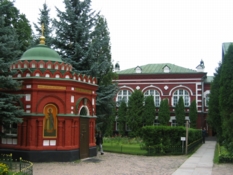
 Stanzas written at tsarskoye selo, where pushkin studied at the lyceum
Stanzas written at tsarskoye selo, where pushkin studied at the lyceum
1
Woe is me! They've burned you to the ground!
More bitter far this meeting than a parting!
Here once a fountain played its waters sparkling
On avenues of trees whose leaves made whispering sound,
And sunsets spread like crimson seas,
And April brought the scent of earth unbound-
And the first kiss....
2
In a day long past the leaves of that willow-tree withered,
To revive in my verse with the gleam of their silver enhanced.
The roses are dead; not so the songs of the students
Borne to fancy's ear as the magical evening advanced.
Fifty years gone! Lavishly blessed by Fortune,
I forgot, in the frenzy of days, the passing of years.
I shall never go back, but will cling to the image of places
Beloved when on Lethe's dim banks my spirit appears.
ANNA AKHMATOVA (1889-1966).
Translated by Margaret Wettlin.
ANNA AKHMATOVA (1889-1966).
Born near Odessa in the family of a marine engineer, she spent her childhood in Tsarskoye Selo near St. Petersburg. Attending school and studying law in Kiev, she went on to study history and literature in St. Petersburg, where she lived most of her life. She was then writing about loneliness and unre-quited love, but gradually the intimate record of a lonely woman's heart became a chronicle of her own life and of her country's destiny. Evacuated from besieged Leningrad during the war, she lived for a time in Central Asia where she wrote many well-known patriotic verses. After the war she visited Italy, England and France, receiving an honorary D. Litt. degree from Oxford University (1965) and in Sicily the Etna-Taormina international poetry prize (1963).
Anna Akhmatova is the literary pseudonym of Anna Andreevna Gorenko. Her first husband was Gumilev, and she too became one of the leading Acmeist poets. Her second book of poems, Beads (1914), brought her fame. Her earlier manner, intimate and colloquial, gradually gave way to a more classical severity, apparent in her volumes The Whte Flock (1917) and Anno Domini MCMXXI (1922). The growing distaste which the personal and religious elements in her poetry aroused in Soviet officialdom forced her thereafter into long periiods of silence; and the poetic masterpieces of her later years, A Poem without a Hero and Requiem, were published abroad.








